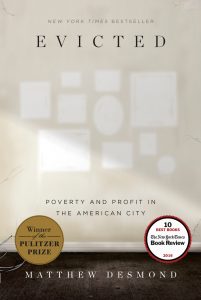
Matthew Desmond, author of the UM Common Reading Experience selection for 2019, will be the keynote speaker at the university’s Fall Convocation in August. Photo by Michael Kienitz
OXFORD, Miss. – The critically acclaimed New York Times best-seller “Evicted: Poverty and Profit in the American City” has been selected for the University of Mississippi‘s Common Reading Experience for 2019.
Written by Matthew Desmond, a Princeton sociologist and recipient of a MacArthur “Genius” Fellowship, “Evicted” was awarded the 2017 Pulitzer Prize for General Nonfiction for being “a deeply researched expose that showed how mass evictions after the 2008 economic crash were less a consequence than a cause of poverty.”
The book has been described as “a landmark work of scholarship and reportage that will forever change the way we look at poverty in America.” Since its publication, “Evicted” has been credited with transforming how the nation understands “extreme poverty and economic exploitation while providing fresh ideas for solving a devastating, uniquely American problem.”
As the selection for the Common Reading Experience, “Evicted” will be the focus of campuswide discussions throughout the 2019-20 academic year.
All incoming freshmen and transfer students will get copies of the book with instructions to read it before the fall semester begins. Instructors will use the book in their classes, and faculty and staff are also encouraged to read “Evicted.”
The author also will be the keynote speaker at the university’s Fall Convocation in August.
“I am proud that UM gathers together around a common reading every year,” said Stephen Monroe, chair of the Department of Writing and Rhetoric and of the Common Reading Experience Steering Committee. “First and foremost, we are an intellectual community; we need good books.
“When first-year students arrive for orientation and receive their copy of the common reading, they are being welcomed and initiated into our community of learning. They are being reminded that college is about engaging new ideas and developing social responsibility. ‘Evicted’ will challenge all of us to think deeply and compassionately about our world.”
 “Evicted” was selected for the Common Reading Experience after a monthslong process that began this past fall when faculty, staff and students, as well as alumni and residents of the greater Oxford community, were invited to nominate a suggested title.
“Evicted” was selected for the Common Reading Experience after a monthslong process that began this past fall when faculty, staff and students, as well as alumni and residents of the greater Oxford community, were invited to nominate a suggested title.
Members of the Common Reading Experience sub-committee chose from the nominated books that were ideally less than 400 pages, available in paperback, written by a living author and published within the last five years, all to ensure the book is accessible to students and readers in the community.
The Common Reading Experience began with the 2011-12 school year. Ten selected short stories by UM alumnus and Nobel Prize-winning author William Faulkner were featured as the university’s 2018 Common Reading Experience.
Previous selections include “The Education of a Lifetime,” a memoir by UM Chancellor Emeritus Robert Khayat, “Just Mercy: A Story of Justice and Redemption” by Bryan Stevenson, “The Immortal Life of Henrietta Lacks” by Rebecca Skloot, “The Girls of Atomic City” by Denise Kiernan and “Crooked Letter, Crooked Letter” by Ole Miss professor Tom Franklin.
“Even though ‘Evicted’ is situated in an urban space, the faculty, staff and students who served on the selection subcommittee felt that it has universal appeal,” said Kirk Johnson, associate professor of sociology and African American studies, as well as co-chair of the selection subcommittee. “Whether our readers are from large cities or small towns or even other countries, we think the university community as a whole will be drawn into every page of this remarkable book.”
“The selection committee members loved ‘Evicted,'” said Leslie Banahan, assistant vice chancellor for student affairs and co-chair of the selection sub-committee.
“I believe our students quickly will be drawn into the lives of the families featured in ‘Evicted’ and will find themselves invested in their search to secure housing, to have a warm, dry place to call home. Reading is at the core of the college experience; what better way for a new student to begin his or her college career than by reading a Pulitzer prize-winning book that tackles one of our society’s most pressing needs?”